#Can you tell I'm a linguistic nerd?
Explore tagged Tumblr posts
Text
what i like especially about the pronouns in the goblin emperor is that this language doesn't just have the T-V distinction (aka informal vs. formal second-person pronouns, in this case 'thou' vs. 'you'), it also has informal and formal first-person pronouns. having BOTH of these distinctions in the same language lets you fine-tune your tone by mixing and matching. with only one axis of formality, when you use informal pronouns, are you being familiar in an intimate way, or in an insolent or dismissive way? when you use formal pronouns, are you being polite or standoffish? you can't tell just from the pronouns; there's ambiguity. but a language where you can use a formal first-person pronoun in the same sentence as an informal second-person pronoun allows you to distance yourself (via the formal first) while also being familiar (via the informal second), thereby achieving the conversational tenor known to linguists as Fuck Thee Specifically.
#just kidding i don't know what linguists call that tenor. or any tenors. i'm not totally positive what a tenor even is#but i can't let that stop me from writing a jokey post on tumblr dot com#register is a very interesting area of linguistics that i know very little about#so i'm probably revealing the depths of my vast ignorance here to all the sociolinguists who surely hang on my every word#but i've always thought of the formal/informal pronoun thing as being about two things: intimacy-distance & rudeness-politeness#and of course you can usually tell from context whether a formal pronoun is meant to indicate distance or politeness#(plus distance and politeness are related to each other (to various degrees depending on culture))#but it seems like it would be cool to have a built-in alignment chart of sorts just for pronoun combos#instead of prep jock nerd goth...why not try intimate self-effacing polite superior?#the goblin emperor#pronouns#register#sociolinguistics#my posts#f#anyway i know i said i wasn't going to reread the goblin emperor...but guess what. lol#and i edited my tags on that earlier post but fyi the language DOES distinguish between plural and formal singular pronouns#i had said i thought it used the same pronouns for plural and formal but i just wasn't paying close enough attention#so anyway i just reread the part where maia is talking to setheris in formal first and informal second#and you can see setheris going ohhh shit. oh shit oh shit oh shit#i'm in biiiiiig trouble#you sure are dude. that's the Time to Grovel signal#it's interesting because at the very beginning of the book when i first saw the formal first used i just thought it was the royal we#because i knew the main character was supposed to be royalty#but then EVERYONE was doing it. so it's not the royal we it's just the formal we#however. this does make me realize that the way the royal we would function in a language that retains the t-v distinction#is the same way i'm describing here. it's just reserving that particular tone (i'm better than you and am displeased with you)#for royalty only. which makes sense given royalty's whole deal
1K notes
·
View notes
Text
I keep noticing small language things and other parallels when it comes to AA & DGS XD I almost always listen to a combination of all my dubbed relaxing game OSTs while I'm writing. I think it's because both played relatively close to each other tonight, but Edgeworth's theme from JFA onward and Kazuma's grand reveal have similar naming schemes.
Edgeworth's is 「大なる復活~御剣怜侍」 (or the other way around; romaji for it is ounarufukkatsu - mitsurugireiji), its English title being "Triumphant Return - Miles Edgeworth." Kazuma's is 「大なる帰還」 (ounarukikan), and in English it's "His Glorious Return." I guess they're also pretty close in English, but the difference in endings (復活 vs. 帰還) is really the word that changes instead of the adjective (大なる, which roughly means "great" in both cases).
I'm relying a lot on google since I'm still a beginner when it comes to speaking Japanese b u t I only got curious about this because the actual verb for "to return" is 帰る (kaeru), which shares the same kanji with 帰還 and then it went downhill from there.
復活 (fukkatsu) is actually closer in English to resurrection or revival, which makes a lot of sense considering the first time the player actually hears Edgeworth's theme. If I remember right (it's been a hot second since I've played JFA), the first time you hear it is in the police department in 2-4 after Edgeworth butts into Franziska and Wright's conversation after being presumed dead for... I don't remember how long oops. There's the literal revival of him being not dead and coming back to Japanifornia, but also the metaphorical revival of him learning to be a better prosecutor.
帰還 (kikan) roughly translates to repatriation, which is a big word I didn't know until I googled it. Oxford says it means "the return of someone to their own country," which is of course super interesting with the context of when it plays in DGS2. It's during the scene where it's revealed who the Professor is and Kazuma gets his memories back. You can interpret it in the way of his memories returning to their rightful place, essentially "coming home," or in the way that home isn't necessarily a place and he's been "reunited" with his father and/or friends after so long. OR (I'm spitballing here as the ideas come to me) it's super weird in the sense that the meaning doesn't match since Kazuma wasn't born in England, but it could mean repatriation in the sense that he's "freeing" Genshin's spirit by destroying the waxwork and retuning it back home, Japan or Karuma or wherever it is.
Okay I'll shut up now byeeeeeeeeeeeeee
#ace attorney#dgs#the great ace attorney#dgs spoilers#kazuma asogi#miles edgeworth#language nerd#analysis#i'm such a nerd ignore me lol#i need to stop doing this omg#this is what i'm doing instead of writing oops#can you tell i'm an english major with a passion for linguistics?#slk.overanalyzes
15 notes
·
View notes
Text

ok but the thing is that "hurt" is an adjective, verb, and noun. so the linguistic poeticism is still there, albeit in a slightly different way. yes, "hurt" as a description of a person's state holds true across tenses because it is indeed an adjective, but the fact remains that it's a lexicologically interesting word! personally, what i find really neat is that "hurt" is both an intransitive verb used for the person being wounded and a transitive verb for the act of wounding someone. it's an intriguing concept to think of pain as something that draws connections between people. something that weaves together victim and perpetrator in some inseparable way. that you can't hurt someone without it changing you as well. idk what exactly that says about pain as a human experience, and it's a lot of using imagination and metaphor to extract and extend meaning from language, but it's still fascinating!
#also hot take the culture of dunking on people for mistakes for the sake of likes or reblogs is a toxic part of this website#and the whole internet in general tbh#like#of course people make mistakes. not everyone has spent hours researching linguistics.#that doesn't make them stupid#your knowledgeability of grammar doesn't make you intellectually superior#maybe your pretentiousness about it actually just makes you unkind#just a thought#op was just excited about the idea that even words capture the lasting nature of pain#you don't need to belittle them and stomp on their joy just because they made a syntactical error#you can tell people they're mistaken without being a dick about it#and i LOVE linguistics and connecting with other language nerds getting overly excited about the magic of words#but having that as an interest doesn't make me inherently better than other people?#i'm not god's prettiest little princess just because i get excited about lexicology more than the average person#and all of this would still be true even if “hurt��� wasn't a cool multipurpose word!!#just. people should be able to not know everything about a topic and not be ridiculed for it#horribly cheesy middle school posters were RIGHT bullying isn't as cool as you think it is#ok this post about yay words has turned into an overarching critique of the lack of human empathy and grace#time for me to shut up#linguistics#languages#language stuff#lingblr#my thoughts
3 notes
·
View notes
Text
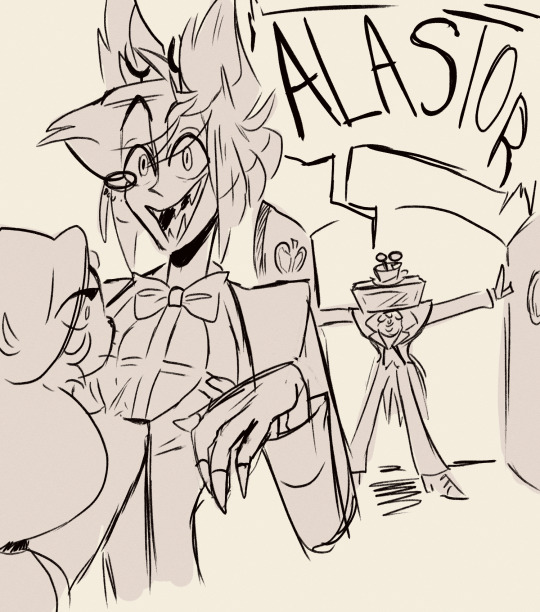
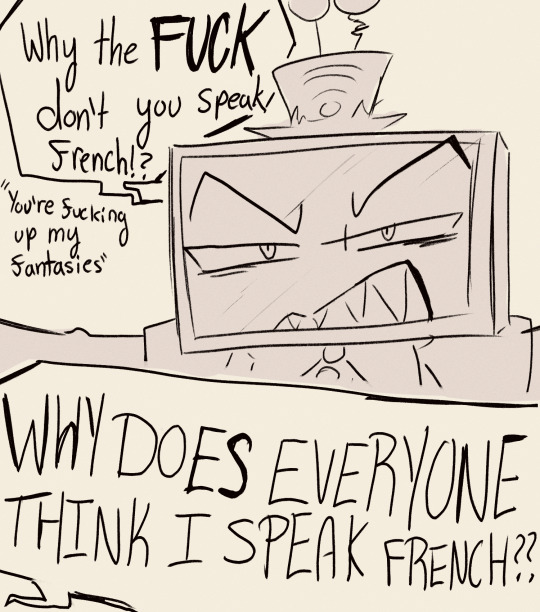
Next thing you'll say is he doesn't have a tail
ref to this pic
EDIT: Just to keep things clear I didn't really think about bringing it up but not everyone's gonna click to see the first picture and might be confused. Alastor was stated to know only a little bit of broken French, the reasoning due to being from New Orleans. Speaking standard French is very much not a thing in New Orleans, so he would logically only know French-Creole. This is very different from the standard French language and a large misconception that people from New Orleans speak regular French. So yes, he does speak some French, just not as well as people make him nor would it, in theory, be the regular French that everyone makes him speak [but I wouldn't put it past the writers to not do that research but maybe I have too little faith in them]. I'm not from New Orleans, I visited it once so it's not like I'm an expert. But I HAVE looked into it and just bothering with one Google search will tell you it's not common and you'll even have a special term called "Louisiana French" pop up. With that all said, these were statements made on years past streams and could've been changed in the official series. However, as of right now, the official statement is that he speaks only a little broken French that should technically be French-Creole if they're going by and that he's from New Orleans to know that language. And again, I don't have a lot of faith in writers to do the research into it being Louisiana French rather than regular French, but now I'm rambling lol This is just a bit of context for this comic so people who were curious can understand it a bit more. And it's totally possible I got something wrong, so feel free to point it out when I do. I just like to dig into the nooks and crannies of information for things :3 2nd EDIT: Just for any future reblogs, I did get somethings incorrect in the above (not surprising), so here's some of the corrections I got:
@mangotangerine: "A tiny nitpick - it would likely be Louisiana Creole, which is one of the French-based Creole languages (Haitian Creole is prob the most well known as it has about 10-12 million speakers vs Louisiana Creole which has around 10,000 due to multiple factors but especially legislation in early 1920s outlawing it). Louisiana French is an umbrella term for the various French dialects/etc in the region (e.g., the dialect Cajun French)." (We actually had a whole conversation in the comments of this post and highly suggest looking down there in case you're interested in learning more!)
@alyssumflowers: "I am from New Orleans and a little bit of a language nerd. You're confusing some things here. Cajun French is a dialect of French. My great grandmother spoke it fluently, my grandfather in pieces.
Louisiana Creole is another language entirely. The word "creole" means mixed and a creole language is basically a mixture of two or more languages. Sort of, it's a linguistics thing. Anyways. Louisiana Creole has next to no speakers left and I've had a hard time trying to find somewhere or someone to learn it from because I really want to." (Always great to hear from someone who has more insider knowledge on the subject! So I wanted to give this it's share due as well, hope you can fine somewhere to learn it! /ᐠ > ˕ <マ ₊˚⊹♡ )
Thank you for the comments! My previous statement still stands about Al probably not speaking normal French, but I wanted these corrections still known and pointed out :3
#Celtrist#cel doodles#fanart#hazbin hotel#hellaverse#hazbin hotel fanart#hellaverse fanart#artists on tumblr#hazbin hotel alastor#hazbin alastor#alastor the radio demon#hazbin hotel charlie#hazbin charlie#charlie morningstar#hazbin hotel vox#hazbin vox#vox the tv demon#radiostatic#radiosilence#onewaybroadcast
1K notes
·
View notes
Text
I don't typically feel at home with "nerds" (in the sense of "programmer type guys"), because I feel there is something important about the world that very often they cannot see, and I am going to try to articulate what it is.
First, a digression.
My extended family is... well, most of them are not really evangelicals (insofar as they're Christian at all, they're not very good Christians and they mostly don't seem to care), but culturally they're part of the vulgar evangelical milieu; the sort of people to whom prosperity gospel megachurch pastors appeal. Years ago when I was about to start college, my uncle came to visit, and I told my him that I was going to study math. He's a smart guy, and started telling me about how he was always good at math in school, and telling me stories about the various times he'd used math (meaning, basically, elementary algebra) to great effect in his various business ventures. That's what he understands: business, making money... to put it less charitably (though I say this with considerable affection): scheming. So he tried to speak the language of making money to me about it. When he asked me what I wanted to do with my math degree (by implication: what sort of scheming was I looking to get involved in) I said something to the effect of "there are all kinds of job opportunities you have with a math degree, but that's not really why I'm studying it—I really just want to understand math at a deeper level". I remember the look on his face when I said that very clearly. It was utter bafflement. Not because he hated math or something, but because I genuinely don't think the concept of "wanting to understand something at a deeper level for its own sake" had ever occurred to him. The inherent appeal of understanding the world is, I think, not something which exists (or exists very strongly) in his emotional landscape. He is blind to that part of the human experience which drives scientists to be scientists.
Well, that's alright. He's a schemer and not a scientist by nature. Some people are that way. I like my uncle well enough, and I enjoyed talking to him on that visit. But he's not someone I would try to share my love of math or linguistics with; on both accounts I don't think there is anything I could say to make him get it.
Why do I bring all this up? Well, one way in which I relate to programmer type guys is that we both like math, and I think we like for basically the same reason. And I think most programmer type guys will have met someone like my uncle, someone who seems like they fundamentally cannot see the appeal in this thing which drives you so strongly, this thing which is so great a part of your emotional landscape. I'm sure a lot of you will know the exact feeling I had during the above interaction. You are so fascinated by these questions about how the world works, and how it can be rationally understood, and this other guy basically seems like he just... can't even comprehend what it's like to be motivated by that. It's so completely foreign to him, and his perspective is thus completely foreign to you.
We are all, sometimes, this uncle.
Part of why I am interested in linguistics is because I have this deep urge to explore the world (by this I mean principally: the human world). I have this desire to travel, to talk to people, to see and experience different places and different ways of doing things. I want to go to various places and see what they look like, and meet the people there and hear what they have to say, and so on and so forth. There is an "openness to experience" element to this, but that is very insufficient to characterize the thing I am trying to articulate; for instance, I have little interest in psychedelics or other prototypical "high openness to experience" type activities. To me, there is an ineffable vibe that every place seems to have (a "place" in this sense could be as large as a country or a small as a particular bar), and the vibes of nested places are like layers on top of one another that make being in the world feel like an extremely rich experience. Learning languages and learning about languages gives me this window into other places, which is extremely appealing, and furthermore I can access it to some degree from my own home, which is nice. Of course doing this from my bedroom is not enough, I want to actually go, to wander around, and in those times when I've gotten the chance to do so I have felt that it was very much everything I had imagined it to be.
When I try to talk to programmer type nerds about this aspect of myself, I often feel much the same as when I was trying to talk to my uncle about wanting to study math. They just don't seem to have any sort of reference for what I'm talking about, these emotions have never occurred to them in any significant way, and they can't figure out how to relate. I believe this is, in essence, the source of my frequent abrasions with rattumb, and why I have basically bounced off of coding for cultural reasons time and time again in my life, even though conceptually it's exactly the sort of thing that interests me. For reasons of nature or nurture, programmer guy personality traits rarely co-occur with wanderluster personality traits, they just don't seem to go together. And so in spaces like, well, this one, I'm just left feeling like nobody can quite relate to what I am getting at a good chunk of the time, and the consequence of this is that I feel emotionally impoverished. That's not anybody's fault for being a different sort of guy than me, and I'm sure there's stuff about which I'm the confused uncle (in fact, I know there is: the appeal of psychedelics, meditation, and other "transcendence" based activities is one of these things for me). Idk, just thought that was something worth expressing.
78 notes
·
View notes
Text
The first fanbook tells us that lately, Mitsuri is hooked on "youshoku" (Western food) like pork cutlet and omelette rice, so her expenditure on food is pretty extreme.


Nowadays, these Japanese-style "Western foods" are pretty ubiquitous but not actually things you run into much in "the West." The ingredients and recipes have changed here and there with how long they've been around, so a nerd buddy who knows Tokyo better than I do (and who is a Mitsuri fan) insisted I try out what these things would have tasted like in Taisho. That's why she took me to Rengatei, where some of Mitsuri's favorite dishes were born.

I'm going to let this food blog do the talking about the restaurant itself and how it has the credit for creating many well-known dishes, including pork cutlet and omelette rice. It's an interesting, short read.
We'll focus most on what Rengatei might mean for Mitsuri, and on that note, I'll call your attention to the fact that this food blog article first mentions looking for a similar restaurant with a long history in the Azabu Juban area. Mitsuri is from a spot that was known as the Iikura neighborhood of the Azabu area in the Taisho period, and what is now known as the Azabudai area. Back in the Taisho period, this was a glitzy shopping and entertainment area where Mitsuri would have had many options for popular Western style restaurants. Even today, Azabudai feels like an area meant for people who make far more money than I do.
So, if she was spoiled for choice closer to where she lived back then, would she have bothered going over to Ginza, another glitzy shopping area of Tokyo, to visit Rengatei? The restaurant opened in 1895, a year or so before she was born, so it would have been well established, but not exactly new. To that I say, let's assume she'd have had plenty of opportunities to go to Ginza. It's perfectly reasonable to assume she might have visited the restaurant that developed some of her favorite dishes. Even today, Rengatei plays up the retro atmosphere with the table setting and wait staff uniforms.
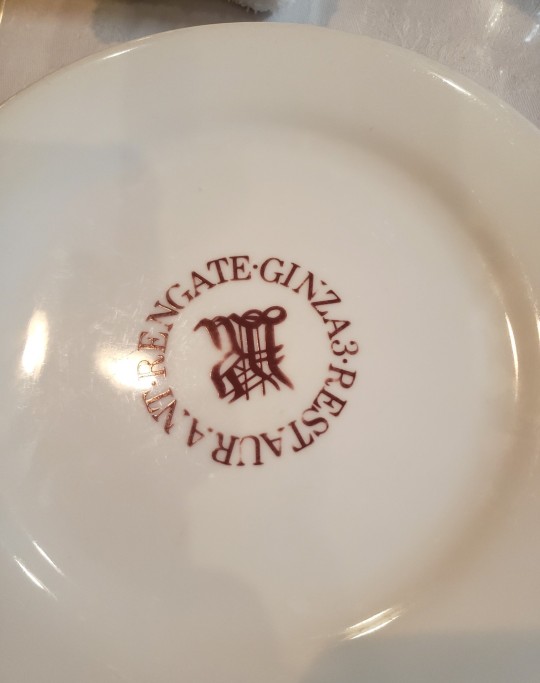
Thing is, despite the retro feeling of modern-day Rengatei, this building was constructed in the 1960s. Mitsuri's wouldn't have seen the place in the same way you can see it today.

The kicker is that it would have been the same Meiji era recipes.
My friend who took me along asked for my thoughts on the food afterward, and we arrived at the same conclusions about it being not amazing, but feeling a little imperfect compared to many other versions of these recipes that we've had. Like you can tell these were freshly developed and on the homestyle side. I had the omuraisu (omelet rice, as it is better known today instead of the long o-mu-re-tsu-rai-su* as it used to be known), and she had the tonkatsu (pork cutlet, which is also a shorter way of saying po-o-ku-ka-tsu-re-tsu*, with "ton" for "pork").
*Both the KnY fanbook and the Rengatei menu use old, long names, though there was some linguistic variation like ka-re-ka-tsu or ka-to-re-to until the current names were settled on.
So why were these sorts of foods such a big deal? There were a lot of new foods introduced to the Japanese diet over the course of the Meiji period, especially meat, since Japan was very influenced by Buddhism and not widely in the habit of eating it (but you can always find exceptions, and different strains of Japanese Buddhism vary in how much they condemn certain lifestyle choices). Many new meat dishes, like curry and sukiyaki (or rather, gyunabe as Rengoku knew it in his bentou), were fancy and expensive and novel in the Meiji period. Perhaps more surprisingly, eggs were also a luxury item (though they have a complex history in the Japanese diet).
Granted, by the time the Taisho period rolls around, a lot of high society in Tokyo has already had some time to get used to these new menu items being a thing, and how much they were adopted into people's lifestyles varied as much as how much they adopted Western attire and houses. On that note, it is very interesting how in the flashback to Mitsuri's family life, they live in a very Japanese-style home and visit Japanese-style establishments and eat Japanese-style sweets, but by the time we join Mitsuri for Hashira training, there are Western elements to her home (though it is not clear if she lives with family or not), and she eats Western style sweets (beekeeping has a long history, and Western methods of beekeeping were introduced in Meiji long before Mitsuri was born). We can see how quickly what was normal for Mitsuri changed over the course of her life, so it's possible she really hadn't been in a habit of eating Western food until closer to when she joined the Corp. While I'm sure Rengoku was happy to eat anything, his home and tastes still seem to lean distinctly non-Western in comparison.
Anyway, so how was the food at Rengatei? Back to that topic!
I usually associate restaurant omuraisu with being impeccably fluffy, and with a variety of sauces and rices seasonings to choose from, even if ketchup is traditional. However, this omelet had a distinctly flatter, more inconsistent texture than you usually get with standard restaurant omuraisu. It's closer to just the usual flat, bumpy, but at least smoothly beaten omelette you'd be more likely to accomplish at home. Even the ketchup had a bit of a freshly-blended quality to it, but I can't exactly say I'm ketchup connoisseur. For all we know about Mitsuri, she might be.
The pork cutlet was, as you get into it yourself instead of having somewhat pre-cut strips like at many tonkatsu establishments, very clearly a hunk of meat. My usual image of tonkatsu is a evenly tenderized, evenly cooked hunk of white meat, with a stretch of fat along one side. Not so with this--the textures and darkness and lightness of the meat, as well as the amount and distribution of fat, was more typical of a cut of meat that is first and foremost meat; not a uniform product. My friend really loves tonkatsu, and says she prefers this juicy, not-quite-perfected version. Because it is a greasy dish, this is why Rengatei introduced the convention of serving it a bed of shredded cabbage to aid in digestion, which all of Japan has copied ever since.
As a brief note, most online sources say "yeah, Rengatei invented tonkatsu (but we're all probably copying the same source)." It seems there is another restaurant (Ponchitei) that claims to have invented tonkatsu before or after 1897, and for what I've poked around, the claims for Rengatei's invention aren't clear, but 1899 seems like the most likely time it entered the menu (I saw a claim for 1890, but the restaurant didn't open until 1895...).
Anyway, tl,dr; I did feel I was eating something closer to what Mitsuri would have known and loved by having eaten at Rengatei.
I also felt it went to show why her food bill was so high, because Rengatei is not cheap (like, about twice what I'd typically be willing to pay). You're paying for some ambiance and history here, as opposed to just a standard meal. Also, it is worth noting that although there is scant official information for the parent restaurant in Ginza, there is a lot more information for an off-shoot restaurant in Fukagawa that opened in 1928. That includes a short, cute English article introducing Western foods.
But hey, despite the stiff prices, I was full and satisfied after one plate of omuraisu and a couple bites of pork cutlet. Mitsuri-chan has a Hashira salary, so she can afford as many servings as she likes.
116 notes
·
View notes
Text
i decided to actually monologue about finnish vowel harmony (while avoiding my real responsibilities) inspired by this post by @seokoilua so anyone wanting to learn the difference between "khaarija" and "käärijä", here goes!
disclaimer i am not a linguist or a voice teacher. just a nerd trying my best.
so that post is a great example bc you can see jere say the word "käärijä" in a very relaxed manner. the second clip is even better than the first, because he keeps his intonation very naturally finnish.
listen to his voice and look at the shape of his mouth. the Ä vowel is not a very "relaxed" vowel. that's because it is a front vowel.
finnish vowels are divided into front vowels, back vowels and neutral vowels. front vowels are: Ä, Ö and Y. back vowels are: A, O and U. neutral vowels are: E and I.
notice how front vowels kind of have like an equivalent in the back vowels. Ä and A, Ö and O, U and Y? it might feel natural to think they are similar sounds, different flavours! but no! they are not!
back vowels are called back vowels, because the sounds you produce should resonate further back in your head and even deep in your throat. they are very relaxed vowels: your jaw is relaxed and there is little to no tension. The A vowel is about as relaxed as you can get. U and O of course demand some tension in the lips and a bit in the jaw, so you can form the necessary shape with your mouth, but your jaw should still be preeeetty relaxed and your lips are forming round shapes more than anything.
now look at jere saying käärijä again. "käärijä" is not forming round shapes in the lips. front vowels bring more tension to the lips, the mouth opens to the sides much more.
front vowels are called front vowels because the voice should resonate much more to the front of your face and mouth. think almost nasal (but emphasis on the almost nasal. i'm saying this because it's a common way to understand making your voice resonate in the front of your face. you don't need to go fully nasal for front vowels.)
so, if we want to talk about what bojan does "wrong": you can't see his mouth shapes very well in the first clip, but i've noticed, in multiple videos, that he tries to say "käärijä" by opening his mouth bigger but taking his jaw down and forming round-ish lip shapes. he is mimicking an A vowel but trying to make it Ä by adding some sort of twang. he gets close when he mimics jere's voice and accent, but have you ever noticed that his jere imitation is more nasal than jere actually is? bojan seems to be trying to pull the vowels he knows naturally into a nasal placement, because i'm sure he can hear that jere's placement is different - he just hasn't grasped the nuance.
and this here is why generally speaking, in finnish, front vowels and back vowels don't go together. it's käärijä and not käärija, because it couldn't be käärija. käärija would be very difficult to say to a finnish person, because to jump from a long ÄÄ to a short A would mean having to adjust your vocal placement really quite radically. (the exceptions to the rule are compound words and loan words, for reasons. sorry to tell you this.)
so bojan's solution is some sort of a half way placement that he makes more nasal depending on how funny he wants to sound, i guess lmao. HOWEVER i think he has improved and sometimes gets very close, but in the Ruisrock clip a finnish person can definitely hear that his Ä vowels are just a tad off. that's because they are a bit too round and a bit too "in the mouth" - like an A with an accent, not a clean Ä. (btw "in the mouth" is a very neutral vowel placement, used for E and I in finnish.)
final thing: i know some of these things can be hard to hear and hard to see, because finnish is not a super expressive language vocally. it's quite... low key and monotone even. but if you want to learn the differences in vowels, i might suggest doing them exaggerated first to find the placement and then toning them down to make them flow easier.
and anyone with actual proper expertise on the matter, feel free to jump in!
48 notes
·
View notes
Text
re: 405
This is gonna be long.
First, I'm bringing this post back around to remind people that kocchi is a pronoun of ambiguous plurality.
This means that an interpretation of "we" is just as correct as an interpretation of "I." Readers may interpret it differently, but on simply linguistic grounds, they are of equal validity.
You will often see this kind of ambiguous language used in Japanese, even with characters that are forthright. The reason is one part cultural expectation that the listener will read between the lines, and one part a willingness to accept two things as simultaneously true. This exists and is frequently found in English as well, there just isn't a direct parallel for kocchi itself.
What I want most out of writing this blog, aside from personal enjoyment, is for people to understand that there can be more to a story for you to engage with, think about, and be moved by, when you step outside the boundaries of your own language and culture.
I think that is a much more interesting space to be in than a gotcha-laden approach of trying to prove something wrong or bad.
But if we are going to talk accuracy, the fact is that the fan translation many people have been upholding as superior has just as many problems as the official one. It takes just as many creative liberties, they are simply different ones.
The fan translator centered an "I" reading and, rather than using either of the two pronouns provided by the text ("OFA" and あいつ, meaning "that guy"), added a narratively-charged word ("nerd") that did not exist in the original and which (as far as I can tell) Katsuki has never used when speaking to villains. As a translator myself, I really disagree with that second choice. The official clearly missed the callback, but noticed the theme of "everyone who has faced AFO until now" and went with "we." The rest was just style over substance which prioritized edgy language to capture the aggression of the line; this falls squarely in line with what Viz has consistently maintained as its in-house aesthetic. It's disappointing, but unsurprising to me.
Fandom oscillates pretty violently between vilifying the official English release and fawning over it. Whole fan theories are built upon nitty gritty bits of the official release's phrasing; people will get excited over how homoerotic a line sounds, and it's because of how the official translator worded it, rather than any innate implication in the original Japanese.
If you do not speak Japanese, your experience of MHA is fundamentally dependent on the work of translators. I respect that everybody has their personal tastes or hopes for how the series will go, but it is deeply demoralizing as a Japanese speaker and translator to see fans who don't speak any Japanese at all act as though their opinion has the same weight of authority as people who do.
You are entitled to your preferences, but please recognize that they are based in taste, not personal knowledge. Not all Japanese translators will even agree in their interpretations, but it weirds me out that some non-Japanese-speaking fans will use this fervor to spread misinformation far and wide that proclaims as inaccurate perfectly good official translations, simply because the choices don't suit their own tastes.
The lists of "times the fan translations were better" I've seen mostly contain instances where the fan translators took greater liberties than the official release did, and some fans just happened to like the liberties that were taken.
We all reasonably hated the "best friend" fan translation of chapter 359, but somehow that isn't a point forever against fan translations the same way mistakes in the official release are?
At this point, it makes me wonder what the point of writing about linguistic nuance is, if the interest is primarily not in learning but in being told what you want to hear.
I know posting this won't win me any favor with anybody, but it's how I feel. I'm bummed about 405's last line in the official. I do hope it gets revised. But the vibes around translation details are getting decidedly unfun.
One last thought: if you well and truly want to experience MHA unfiltered, learn Japanese. I mean this sincerely, I'm not trying to be a jerk. We live in an age where it is easier and more possible than ever to acquire a new language, talk to people around the world, and absorb yourself in culture and history.
If you want to remove middle-men and develop your own relationship with a work unfettered by the tastes, biases, or choices of others, learn the language. It won't be easy, but I can guarantee you won't regret broadening your horizons and discovering even more beautiful stories in the world.
143 notes
·
View notes
Text
Word of the week rules and submissions!
What is this?
This is no longer a tournament as that takes too much time and admin. We have also already decided that многоꙮчитїй/ mnogoočitii from Old church slavonian is the best word, so no need to do that again. Instead, I will use this blog to highlight a word (or a couple of words) every week (or other time period if the queue runs out) from languages which aren't English. This will be based on reader submissions with me editing for clarity and adding a blurb about the language, much like in the tournament.
In short, tell me about your favourite words! Let's all learn something new! (My favourite phase of the tournament was definitely research/round one)
Who are you?
I'm a linguistics student and language nerd from Sweden who decided to run a tournament of non-English words because I wanted to highlight language diversity. My native language isn't English, so please be kind if my posts are worded weirdly sometimes (or my username is misspelled lol)
What makes a word good?
There are many ways that a word can be good, but here are some examples: it sounds good/feels good to say, the script looks nice, it denotes an interesting concept, it denotes a concept you like, it does something interesting grammarwise, usagewise or soundwise, it's funny, it's an interesting/fun compound, it has an interesting/fun etymology, it just has good vibes... The possibilities are endless
Rules:
No words in English, but loanwords from English are allowed with good motivation
No conlangs (I love them but the focus is on natural language)
Words from signed languages are allowed and encouraged as long as you can provide an explanatory picture or film for the sign
Words from pidgins are allowed
Words from extinct languages are allowed
Usage should be widespread within a language community (if it isn't/wasn't used in the language it doesn't belong, neither does words only your family/friend group uses, but slang words are allowed)
No words that have appeared in the tournament or previously on word of the week (search for the word on my blog, all words are tagged)
How submissions and posting work (read these before submitting):
Each person is can make two submissions at a time. Please wait until yours have been posted before you submit more
The submission form is currently open. It will remain so until I have too many unposted submissions, then open again when those have been scheduled
If you're able to, please provide an IPA transcription for your word (the International Phonetic Alphabet has a sign for each sound used in any language, which makes transcription of exact pronounciation possible)
You will need to provide a translation/explanation of the word in English since that is the language used on the blog for ease of communication and reach. If the exact translation of a word is part of what makes the word good, please provide that too
It is possible to be credited for your submission if you want to
If more than 5-6 words in the same language are submitted, all of them might not be posted until some time has passed to avoid one language dominating
I reserve the right to pick which words I want to share if I have many submissions and don't want to do all of them. I do this in my very limited spare time because I think language is fun and if it doesn't spark joy I won't do it
Submissions will be fact-checked, edited for clarity and get a short text about the language. If I find something interesting while researching I might add a note about that as well
Have fun! I can't wait to see your submissions and learn something new!
Submit your word(s) through this form
39 notes
·
View notes
Note
hi!! chants of sennaar looks neat, could you tell me what is abt? (invitation to infodump)
FUCK YEAH thank you for asking
chants of sennaar is an indie puzzle game with heavy inspiration from the myth of the tower of babel. you are climbing through a tower where several different peoples have gathered and all of them speak different languages. you start the game knowing none of the. to travel through the tower you have to learn their languages, solve puzzles, and help people out.
i'm not a big linguistics nerd but the conlang in this game is so neat and fun to figure out. no spoilers but none of them are 1-1 translations to english, all of them have their own grammar rules and lettering style.
the art is so pretty and the puzzles are great and it's very beginner friendly, you super don't have to be good at video games to play it. i found the translation mechanics pretty intuitive, you absolutely don't have to be a linguistics expert to figure things out.
it's a game about unity and understanding and how we have more similarities than differences. it's also a game in which you can pet a cat. i have 11 hours on it to 100% it but you can definitely finish it quicker i was just slow at times lol. it's so good, highly recommend everyone play it!!!
28 notes
·
View notes
Text
Be wary of linguistics rant, Elden Ring ahead
Ok so I just made a different post about this but I need to elaborate: The Elden Ring messaging system is legitimately such an interesting microcosm about how language is used as a tool and shaped to suit the needs it's being used for. I could actually make an entire study about how this can be used to better understand the formation of pidgin languages in the same way that epidemiologists studied the Corrupted Blood Incident in World of Warcraft to better understand the mechanics of how disease affects human behavior. Video games as an academic lens into peoples' minds has always been a fascinating topic to me, and by the end of this, you'll see why.
First off, message.
So for those not indoctrinated into the series/game, Elden Ring is a big open world game made by From Software, which won game of the year 2022 among some other awards (if you've played it or know anything about it, just skip to the next header). Each player plays as a Tarnished and explores this massive environment called The Lands Between individually, but if another player is walking in the same area that you are, you can see their "ghost" moving through the world, and you can "invade" or "be summoned" into another player's iteration of the world in order to briefly interact with it before returning to your own iteration. This occupies a weird space in between singleplayer and multiplayer, with these heavily limited and kind of random methods of interaction between players, but that's not the most interesting way of communicating with your fellow Tarnished; that title goes to the messages system. You can write a message onto a small stone, and leave it on the ground, and then that little stone with the message on it will have a random chance to appear in any player's iteration of the world for them to read. This is a tradition which has been going in From Software's games long since before the inception of Elden Ring, although I'm mostly going to be focusing on the message system of that title, because documenting the history of the 13+ years running Soulsbourne franchise is way too much, even for a nerd like me. The point is that messages are a lot more likely to be seen than any other method of player-to-player interaction, and you can even leave little "gestures" to go with them, where the reader can see your character striking a pose while they read the message. What a neat little mechanic, which definitely doesn't have any hidden layers of depth, and certainly wouldn't spawn an entire emergent system of pseudolinguistics, right?
No message ahead, be wary of mimicry
Well, when I said that messages are written by other players, that was a lie. To make a message, you don't type it out with your keyboard, you select what you want to say, from a big list of preset phrases. It works that way for a lot of reasons, foremost of all as a profanity filter, but also to prevent too many spoilers and maintain atmosphere. The sets of phrases are incredibly limiting, famously requiring players to use weird fake old-english diction in order to express a simple thought (Strong foe ahead, be weary of death. Look carefully ahead, visions of item. Suffering, o suffering, why is it always bad luck? etc). This seems like a limitation which would put a serious damper on anyone trying to actually communicate their thoughts, but gamers are a persistent sort, and have a lot of trouble taking no for an answer. They also have way too much time on their hands, and like to solve puzzles, a terrifying combination of traits, and the perfect one to accidentally create a conlang. With the unexpectedly massive audience that this game picked up on launch, millions of people left messages desperately trying to get something across, and if the game's preset vocabulary didn't contain the phrases to express it, they would forge their own path. Any big fans of linguistic history can already tell the direction that this might be going, as we move on into the next chapter:
Teacher, Liar, Lovable Sort
When the game released, there was chaos. The Lands Between are fraught with hidden passages, deception, and blatant bullshit, and the first kind of players leaving messages tried to helpfully communicate what you could trust, and what you couldn't. This is what the message system was intended for after all, giving advice to your peers, and what many people still use it for today. The second kind of players tried to do the opposite, deliberately leading people to their doom, just because they could. The third, and most numerous sort, were simply awestruck at everything the game had to offer, and left a series of remarks on the beauty and humor of the world. The messages left by each group are pretty easy to differentiate to the trained eye, which is the main feature causing me to point out this division of players. Let's call these groups the teachers, the liars, and the lovable sorts. A teacher can be recognized if their messages suggest something within reason, and being backed up by the peer-review of nearby messages to the same effect. If three messages are all sitting on the ground next to eachother, each saying something along the lines of "seek up, look carefully ahead", then a local collage of teachers are trying to let you know about a secret path ahead leading you up towards a hidden objective. However, a single message next to a bloodstained cliff-edge stating "jumping required ahead" is almost certainly a liar, trying to deceive an unsuspecting player into making a dubious leap. Liars sometimes use slightly simpler grammar than teachers do, being less committed to getting their point across. Wait a minute, linguistic variance based on intent? No no, this is just a video game about fighting monsters, surely such an interesting emergent system wouldn't arise from something like that. Lastly, the lovable sorts have the most ranging grammar, spanning from a simple word such as "dog" (a word used colloquially to describe all creatures, from turtles to dragons), to complex sentences requiring the combination of many phrases. However, a lovable sort can be differentiated by the fact that they merely remark upon the world as it is, instead of trying to offer advice to other players, as a teacher or liar might. Some of their most iconic phrases are "Elden ring ahead", used to sarcastically denote a dead end where a player might have been expecting treasure, "you don't have the right, o, you don't have the right" which indicates a locked door, or the world-famous "try finger, but hole", a phrase which explains itself. The most incredible thing about the words of the lovable sort, is that they all require a little bit of thinking to understand their actual meaning, but once you get the hang of it, it becomes like a second language to you! Wait a minute, a second language?
Message? Wasn't expecting introspection
As time went on, the three main groups of message-writers still kept chugging along, creating new works of writing every day, but advancements in understanding of the game's inner workings allowed these messages to become more and more complex. Compound words started to be formed to represent concepts outside of the preset vocabulary, like "skeleton, house" for coffin, "dung, key" to describe the donkeys accompanying traveling merchants, and "edge, lord" being used to refer to the NPC Ensha, a man wearing flamboyant armor made out of bones who takes himself way too seriously. It's worth noting in this section that for a specific period of time, The Lands Between were overtaken by a horde of messages stating only the words "fort, night". Despite the crude and humorous nature of the entire thing, it was clear to see that the linguistic patterns of the Elden Ring community were evolving into their own beast, far beyond the usages that the developers had intended. Words had shed their original meaning, to instead take up contextual meanings based on how players used them, effectively becoming different words entirely. Depending on how you define this, it's either a microcosm of incredibly fast and severe linguistic drift, or the emergence of a new pidgin or conlang entirely. If you really stretch things, you could almost call the message system of Elden Ring an entirely new language in and of itself.
Well done, victory ahead!
I think that video games are an excellent way to observe human behavior under conditions which are controlled, accelerated, and completely recordable, and this is the closest that we've ever seen to an entire language growing completely from scratch. People are always the same, whether you want to call it instinct or just cyclical tendencies, but normally the formation of a new language can take incredible periods of time, hastened only by tragic events like diaspora or massive losses of cultural knowledge (research what's been happening to Gaelic as a spoken language for more info about this sort of thing, it's kind of depressing but is also important to learn about, and there's a lot of people on this site talking about it who can do the topic way more justice than I can). Even for other topics which either require great passage of time, or great tragedy in order to research (I.E. geology or epidemiology, respectively), there are a lot of simulations and predictive models which can tell us how these systems behave without actually experiencing them. Linguistics has never had this sort of thing...until now, perhaps. Obviously there won't be any academic breakthroughs based on a bunch of people online all writing "rump ahead", but it's an incredibly interesting thing to see happening for a field which is so hard to actively advance, and it could lead to actual scientific methods of generating new languages via human interaction for research purposes. Of course, there's always the sizable chance that this goes nowhere and I just wrote this insane rant because I like to type, but if nothing else, I at the very least exposed some of my mutuals to "try finger, but hole".
#elden ring#linguistics#elden ring ahead#behold dog#dung key#pidgin language#pidgin#language#old english#linguistic studies#language history#conlangs
61 notes
·
View notes
Text
Hi, I'm just making my about page into a pinned post.
L-Serine is a proteinogenic amino acid.
…
I always feel weird talking about myself, I guess I worry that it makes me seem conceited or something, but I like learning about people through their About pages and pins so I guess I should talk more… so.
Hi! I’m Emily. I’m a huge nerd, which is mostly what this blog is about.
“I’m a huge nerd” means, among other things, I’m infatuated with the Chinese and Japanese languages, and can seriously infodump at you for hours about them. I’m also like this about a lot of other school-related and generally-nerdy stuff (like amino acids, if you couldn’t tell from the blog name/URL).
This blog is probably approximately 50% linguistics.
Popular posts I’ve written include:
- Kanji, an overview of how weird Japanese kanji is
- Racist map projections, the story of the Gall-Peters projection
- Names in Japan, an overview of how people name their kids in Japan
- The Book Test, an opinion on whether viruses are alive
- How to credit card, a practical guide on how to credit card
- Copyright notices are not clocks, about how © is used wrong
- Tiananmen, thoughts and context
- Diacritics in English, about how accents like “é” exist in English, too
Sometimes, this blog veers into politics. I’m left-libertarian: I think markets are a good way to reduce suffering, but the important part is reducing suffering, not protecting property rights or anything like that.
Other things… I’m Chinese and blog about being Chinese sometimes. I’m approximately utilitarian. I’ve lived all across the world and blog about the differences of living in different places. I’m probably a LW-style rationalist. I don’t really talk about myself much but if you’re curious, you should feel free to ask me about me.
I have a sideblog at @serinemisc – a mix of stuff that I think are too spammy for the main blog, including hot takes on programming, quiz results, really casual chatter, and contentless reblogs of stuff I like.
18 notes
·
View notes
Text
it's 1 am, anyway time for walkthrough of my entire rewatch of czech it out. as my brain slowly melts into pieces. get ready for a long-as-shit post.
EPISODE 1!!!!!
youtube
can i say. first of all. wtf are these graphics. what were they thinking and why does it kind of work with the atmosphere.
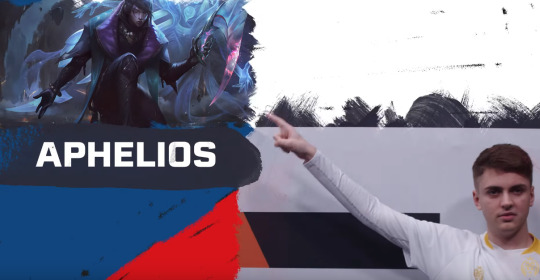

second of all. introduction of the coffee. does carzzy like coffee? is that his coffee? who made the coffee? all differs depending on the video.
introduction of the smiley "i agree to anything carzzy says" humanoid. he has that rookie vibe here like he's very unsure of himself but oh boy marek, carzzy is not a stable anchor.


also, carzzy calling humanoid "marek brazda" every chance he gets, istg. he 100% says it just because he loves how it sounds. brazzzzda.
cut to carzzy calling him unskilled and we get the classic "i've been insulted by carzzy" face. i love that he has these patented modes. so far we've had "carzzy loml you can never do anything wrong (meant ironically)" and "carzzy loml 🥺���� spare me anything sir i haven't but a penny" (it has been 40 seconds)


face is exemplified when carzzy goes out of his way to place his cup on (what i assume is) humanoid's desk, cause of course he does.
humanoid gets asked a question about mid and so carzzy is RESPECTFUL and lets humanoid speak.

just leaving this here. btw: "marek brazda" counter: II
i realize at this point there are so many things to point out but i'm too lazy to screencap them. first of all, carzzy complaining about pantheon/taliyah and humanoid who was not listening at all just going "nice :)" and carzzy also needs a moment to register and then goes. "no." and then they start arguing about something with approx. 0 heart and 2 braincells of what they're arguing about. and then carzzy does the thing where he lets humanoid get the last word (thing he does all the fucking time) and just hums like a girl cause SHE IS down bad. (btw me calling carzzy a girl is not an insult it's an um actually? 🏳️🌈🤓 moment.)

G2 TIME!!
one of the most important things about carzzynoid is their nonchalant complete factually incorrect statements. can guarantee you they think it's the funniest shit ever, however, it's only funny if no one laughs. they have these voices where you can tell they're trying to make themselves sounds as uncaring as possible. anyway yeah guys, g2 is 10th, 9th place team for sure.
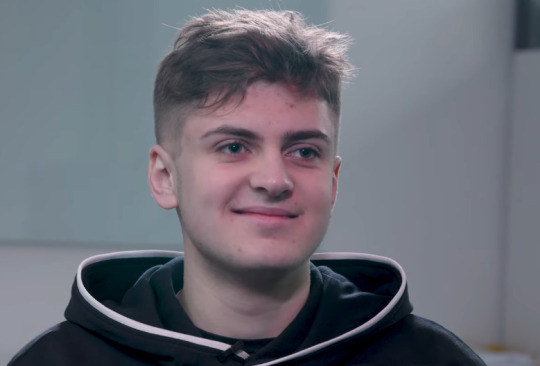
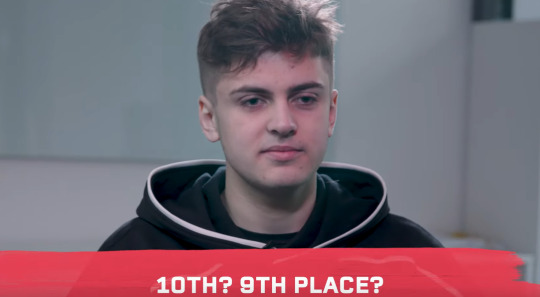
CAN I SAY. carzzy's heterochromia is insane in these early videos. every close-up on his face i go woawwww!! idk if it's more noticeable or if i'm just going insane. anyway humanoid goes on to end the segment with "pojďme se na to společně podívat!" (according to software that seems about correct to me) meaning "let's take a look at it together" otherwise LITERALLY meaning "check it out." or something pretty close. as an EXTREME linguistics nerd and general languages lover i think hearing them speak czech makes me explode about 10 times anyway so. idk if that's a correct analysis :)
THIS carzzy smirk. i could write a paragraph here honestly. anyway humanoid asks a question and carzzy does not answer because why would he.


EYES.
then carzzy goes on a rant about how amazing their coach is only for his genius mordekaiser pick to be wasted on MAREK BRAZDA (counter: III)


insulted marek left, "i'm not blaming anyone" marek right. (carzzy was totally blaming you dude. you're both so horrible.)
carzzy checks in on humanoid for that one, lmao. makes sure that he understands, yep.

NEXT DYNAMIC UP!! the fuckin sad lions/chad lions thing. carzzy thinks they are "sad lions" cause they lost both games.
carzzy calls humanoid a czech, a clearly very embarrassing insult. also he hesitated a bit which meant he was SCRAMBLING for a different insult but really. czech? that's the best he could come up with. pussy.

anyway he's bullied marek into participating in the content and so he actually has to give his thoughts and he thinks he's a bad chad bitch who actually LET them win. also "this guy" counter: I. because humanoid hates calling carzzy anything actually. carzzy is just a pest to him and he needs to express that to carzzy face. obviously.

CONFLICT RESOLUTION!! i love how their dynamic is straight up insult each other until one person goes: actually you're the best i love you so much you're so hot so talented i agree with everything you say i'm a shit stain you're a saint i'll do anytthing-
VIDEO END
final thoughts: ough it's 2:30 am now but it was worth it honestly feels fucking amazing to type all this out imma go to sleep hopefully nobody reads this because really you're wasting your time. if you did <3 thanks.
11 notes
·
View notes
Note
Hi! Since you're a native german speaker and you mentioned Richard's dialect in your last ask, would you be able to tell us a little more about what his dialect's like? All dialects asks I've seen in the past always focus on the Berlin boys/their dialect and I'm curious what Richard's sounds like to native speakers. What dialect does he speak? Is there anything specific to it/that stands out? Is it a noticeable dialect or not really? Does he mix Berlinerisch into it given how long he's lived in Berlin at this point? Sorry if this is too many questions at once, I'm a bit of a linguistics nerd & constantly frustrated that I know so little German I can't actually figure these things out on my own.
Again, very interesting ask. I have to say, I was born, raised and still live in south Germany, so my dialect is pretty different and I'm not really exposed to people from northern regions of Germany (even though a huge part of my family is from the east of Germany, formerly GDR like Berlin itself and some other cities, but they have wildly different dialects). So I might not be the best expert on this.
His dialect doesn't struck me as a total berlin one, even though there are some faint nuances sometimes, like specific words or ways to pronounce words: Schachzeug instead of Schagzeug, irgendwat instead of irgendwas. (Rammstein in America, min. 51). With Richard, from what I've seen, it also depends on the situations, sometimes when he's lively or amused during talking, he also kind of slips a bit more into the berlin dialect than usual.
His dialect reminds me more of a way people speak in Brandenburg, which is the area he originated from (was born in Wittenberge). He still speaks very clear and comprehensible (often just... standard german I guess?), f.e. Paul and Flake (or even Till) are way more "deep" into their berlin dialect than he is.
So I'm not sure if this helps you, that's what I can say about this matter...
49 notes
·
View notes
Text
you wanna know something? I was extremely ambitious as a child. I've wanted to be an engineer and an astrophysicist since before I learned long division. I wanted to be a writer by the time I was 9, and I wanted to be a singer by the time I was 11.
That ambition decreased in middle & high school, but it never fully went away; I decided I also wanted to be a visual artist and a programmer and a polyglot and an activist. On the more casual side I want to study genetics, pharmacology, voice acting, literature, linguistics, anthropology, the occult, & religious history.
I was a straight A student in elementary school. I wasn't just a straight A student, I was a dedicated nerd; I genuinely enjoyed school despite severe social ostracization and I thought most of my homework was interesting enough that I wasn't bored while doing it.
And somehow, despite that, despite that I've always been ambitious and always sought challenge and that I was competitive to a fault, I somehow managed to convince myself I was lazy in middle and high school when my grades dropped due to severe unaddressed childhood trauma causing mental health issues, my ADHD medication losing effectiveness from being on it for a decade, and multiple undiagnosed chronic illnesses. I never actually stopped trying. I'd just convinced myself that because I couldn't complete classwork with the same attention I used to, that because I was stressed and exhausted and had to rest more often, that it was somehow my fault that my grades got worse. No, I'm fucking disabled. No one ever bothered to tell me that ADHD was a disability until I was in high school, no one but me realized I was depressed or autistic until I asked for diagnoses, no one ever took the severity of my chronic fatigue or post-exertional malaise or orthostatic intolerance seriously enough. fuck the way estrogen interacts with dysautonomia y'all it's so bad, testosterone HRT was more effective treatment for it than anything else. i still need salt tablets but my POTS is stable now entirely because of T.
I think the real kicker is that all it took was a bus to my house for me to attend school again. The barriers to success for disabled students often have such simple solutions and yet no one's willing to implement them until forced to. I was convinced for years that it was my own failures & incompetence that were the issue, and all it took was not being forced to walk.
I'm going to start college in the fall and I know it's possible for me to achieve some of the things I've had my sights set on since I was a kid. I still have chronic fatigue and chronic pain and non-24 complicates scheduling, but calculus is a hell of a lot easier when you aren't suffering 3+ types of cognitive impairment simultaneously. side note why is calculus Like That I can do physics related calculus because i learned integrals and derivatives before literally anything else because i was taking AP Physics: Mechanics concurrently with Calc AB during my first attempt at 12th grade, but i struggle to comprehend the rest of it.
A few years ago, I'd resigned myself to not being able to pursue my interests. I figured I wouldn't be able to succeed in anything I tried due to how ill I was. And while I still may not be able to study all of the things I'm interested in at a college, I sure as hell can pursue the most important ones — the original four things I wanted to do with my life. Writing and music can easily remain hobbies; I don't need those to be part of my career to feel fulfilled in them. I'm planning to study cosmology in the distant future (from what I understand, you need a Ph.D to even get started) and I'll be basing my class choices around that; underclassmen all have undeclared majors at my college, but as of now I'm planning to frame my schedule around pursuit of a physics degree (which is also easily transferrable to engineering!). Crushing college debt, here I come — but it's worth it to study astronomy, physics, & cosmology.
All it took was a bus. All it took for me to graduate high school was a bus.
#disability and education#i am way too ambitious#notebeans' random personal essays#ableism#ableism in schools#disabled#disability#internalized ableism#laziness is a myth#actually disabled#autistic#autism#actually autistic#POTS#adhd#actually adhd#post exertional malaise#trauma#mental illness#depression
37 notes
·
View notes
Text
Uh, seems I should give a crash course of Japanese needed to understand Dragon Ball 101... and some things you see in the fandom lol
Just out there: I'm a linguist / grammar nerd, my knowledge of Japanese as a whole is very limited. I just use the following tips to understand most of what's happening and how I deconstruct things, as well as why/how certain things are written!
So here, please check it out if you're interested in how I decipher most of it!
Today.. writing systems !
Japanese uses three writing systems (well, 4):
Hiragana: syllables; mostly used for prepositions and words. They're round and have few strokes.
Katakana: syllables; mostly used for foreign-loan words, emphasis, sounds, and machine-caused onomatopoeia. They're square and have few strokes too.
Kanji: ideograms; Kanji are (usually) words/concepts on their own and there's thousands of them. They come from Chinese. On their own, or coupled with each other, Kanji carry their own meaning. They're also combinatory (aka one kanji can contain many kanji within; check how tree 木, woods 林 and forest 森 are written for example; yup, it's just more trees squished together lol)
Romanji: latin alphabet letters (if I write "watashi", this is romanji). The transcription of japanese to the latin alphabet actually follows some rules, put a pin on it I'll explain that later.
Hiragana and Katakana are the same syllables, if it helps you out, think of them as lower and upper case letters (they don't have the same uses tho). Together, they're called kana.
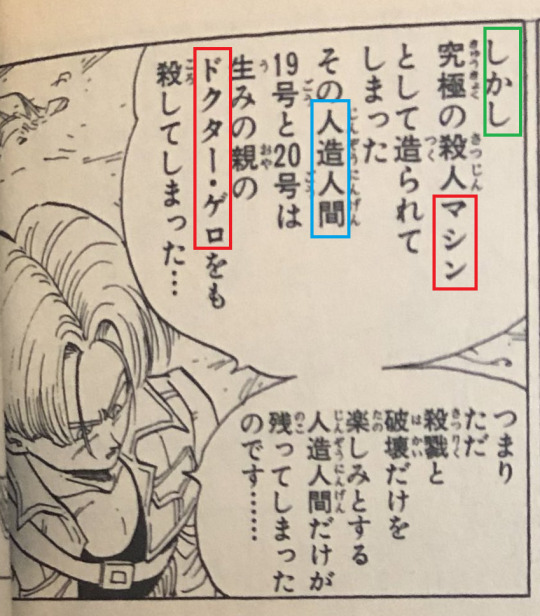
In green: しかし (shi-ka-shi), means "however"); this is written in hiragana
In red: マシン (ma-shi-n ; machine) and ドクターゲロ (dokutoru—gero ; doctor gero)
in blue: 人造人間 has the kanji for man/person twice. It literally translates to "man-made human being" (and in English we've translated this to Artificial Human or Android, while some other languages translated it to Cyborg).
You can see that next to the blue square with 人造人間, there's tiny hiragana (じんぞうにんげん; ji-n-zo-u-ni-n-ge-n); those are called furigana and are present to tell the reader how the kanji is read (and what it means haha). Most shonen manga have them because they're aimed at kids who don't know all of the kanji yet! Furigana are also important because kanji can be read in two different ways (the kanji for mountain is either read as yama or san for instance; it's got to do with the Chinese pronunciation or the word as well as whether the kanji is on its own or combined with another).
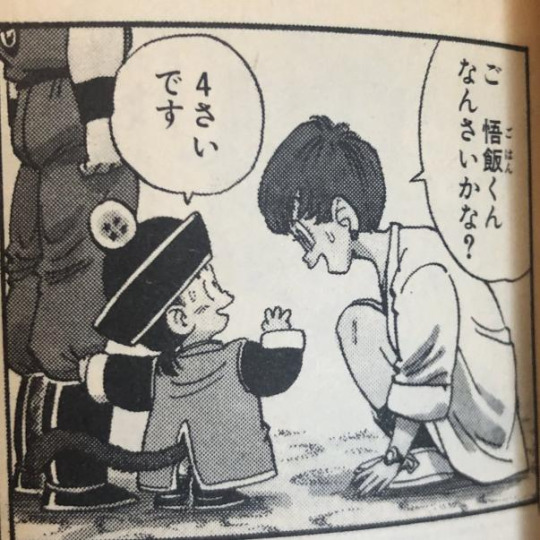
Same here: everything is in hiragana except for Gohan's name (with the little furigana to tell you to read it as go-ha-n) and Gohan's age of 4 (they use the romanji /latin for numbers instead of the proper kanji).
If you remember Death Note, there's a moment in which Misa reads Light's full name above his head, but she reads his first name's kanji (月) as "tsuki" and then she's told it's actually read "light" (ライト; ra-i-to; aka the katakana transcription for the English word light)
Now, remember that pin about romanji? And if you remember some old (oooold) fanfics where Vegeta's name is written Bejïta? Well, this comes from that. Japanese syllables don't allow to transcribe everything, and phonology makes it so that Japanese speakers tend to pronounce loan words according to their syllables.
Dragon Ball's katakana name is ドラゴンボール (do-ra-n-go- bo—ru, or Doragon Bōru in the proper transcription system (the — means "longer vowel" which transcribes to an ō). This is why you sometimes see Goku's name written Gokū or, in old books, Gokuh or Gokou, and his furigana is go-ku-u). And there's a lot of loan-words used as names in Dragon Ball. Vegeta's name are the katakana for BE JI (+ longer vowel) TA.
Of course, when you know "all Saiyans are named after Vegetables", you can easily transcribe "back" to the origin-word that it was supposed to represent (you don't go around and write doragon boru, you write dragon ball, after all). Some are easier than others, and Toriyama (with his dad!boomer energy who loves bad puns) also switched some syllables around... Hell, even Saiya-jin (saiyans) (with jin as the kanji for people/population) is actually rearranged syllables for Yasai (vegetables). With that knowledge, Raditz could be transcribed as Radis or Radish (depending on your language) and Kakarot could be carot (or cacarot).. To go back to the original reference instead of playing translating back and forth forever lol.
Same for Bulma. Her katakana name is bu-ru-ma which is the transcription for "bloomers" (aka those gym shorts). This is why in old doujins, you'll see her name be written as Bluma or Bloomer or any other option around that. Bulma's name is written with latin letters very early on though, so there's consensus about her name, but there are others...
So let's talk about ブラ(bu-ra), the second kid of Vegeta and Bulma.
Until DBS came around, it was generally accepted that her name is Bra (like Trunks' name is Trunks and not Torankusu or Tolanks.. even if some people will write torankusu and I find that hilarious), because everyone in Bulma's family is named after undergarments (Bloomers, Panties (Panchy), Brief (Dr Briefs in English, professor Brief elsewhere), Trunks... and Bra for brassiere or plain old bra).
But in DBS, the anime gave her the Bulma treatment and showed her name in latin letters (Bulla).
Now.. why does it look so weird sometimes?
Because Katakana (and Hiragana) are syllable systems, and as such, no consonant (except for N) exists on its own. All consonants must have a vowel attached to them! And when a foreign word is transcribed to katakana, this is how they (generally) do it:
Base on the pronunciation, not on the actual spelling of the word.
If there's a consonant sound alone, add u (except T and D, those get an o)
If the sound doesn't exist as-is in the syllables available, pick the next best thing (fa will be fu + tiny a to let people know how to read it FA and not FUA). The L and R sounds are grouped together into the transcription with R, but they're more or less pronounced the same (in the middle). If you need a harder R, refer to the next point.
Use "longer vowel before this symbol" (ー) and "harder consonant after this symbol" (ッtiny version) symbols as needed to emphasize stress syllables or. (ベジータ (bejita) カカロット (kakarotto)
Profit.
This is why sometimes you'll see "Furiza" and you'll be "wait what" and then pronounce it and say "ooo.. Freezer". Why does English write it as Frieza? idk. French does Freeza and Spanish Freezer (the name is not the exact transcription for Freezer, since they removed a —; it's フリーザ instead of フリーザー)
Here's a fun example:
ファイナルフラッシュ
Fu-(tiny a)-i-na-ru- fur-a- (harder consonant)shu;
Fainaru Furasshu.
You know those "U" are usually there because of how the syllables work. Let's remove them.
Fainar Frassh.
You also know those R letters aren't hard strong R, so pronounce them a little softer, without rolling them. Pronounce this out loud now.
Did the piano start playing???
As my scanner now works, I'll show you how older fandom people used to transcribe the katakana names in latin letters before there was an official "decision" about such things!
Please feel free to share, correct, expand, etc!
And you can always buy me a doujin to support my work haha
#japanese to english#japanese 101#katakana#hiragana#kanji#vegeta#final flash#trunks#bra#bulla#frieza#dragon ball#dragon ball z#goku#bulma#gohan#linguistics
25 notes
·
View notes